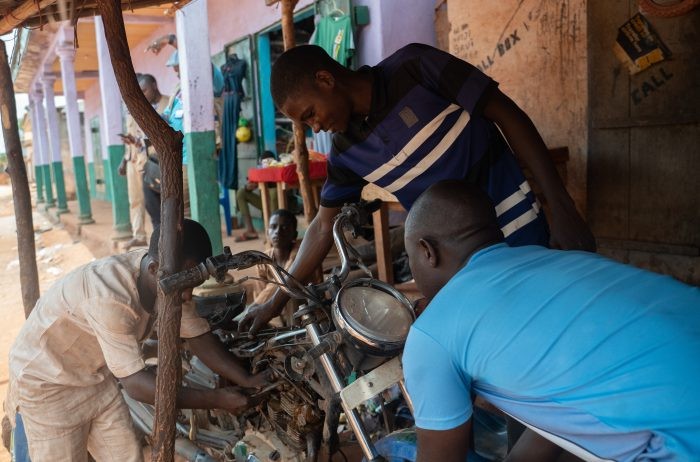Cameroon faces significant humanitarian challenges stemming from conflicts in the Lake Chad Basin, the Northwest and Southwest regions, and the crisis in the Central African Republic. These overlapping crises have resulted in widespread displacement and a pressing need for humanitarian assistance across the nation.
According to the United Nations Office for the Coordination of Humanitarian Affairs (OCHA), by July 2023, approximately 4.7 million people in Cameroon required humanitarian aid. Organizations like the Jesuit Refugee Service (JRS) are actively involved in providing crucial support to refugees and host communities within Cameroon. Their initiatives encompass psychosocial support, community-based preschools, women’s empowerment programs, and vital vocational training opportunities.
Vocational training stands out as a particularly effective tool for empowering young refugees by integrating them into the social, professional, and economic fabric of their new communities. Participants in these programs gain access to starter kits, equipping them with the essential tools and materials specific to their chosen trade. The diverse training areas include hairdressing, catering, baking, sewing, mechanics, and auto-repair, offering a range of pathways to self-sufficiency. Furthermore, for the initial three months of their training, students receive rent support, easing their transition into this new phase of life. Impressively, nearly 600 graduates from these vocational programs have successfully entered the Cameroonian job market, demonstrating the tangible impact of these initiatives.
Sali Djingui, a 36-year-old entrepreneur in Eastern Cameroon, exemplifies the positive ripple effect of these programs. As the owner of a thriving motorcycle shop, Sali employs graduates from the JRS vocational program who specialized in mechanics and auto-repair. He readily embraced the opportunity to support refugees, stating, “When I saw that they were young people who truly wanted to learn and develop in this profession, I didn’t hesitate to accept.” Sali recognizes the inherent value in providing practical skills, viewing them as essential tools for long-term success, regardless of circumstance.
The young mechanics at Sali’s shop work diligently six days a week, reflecting their commitment to building a better future. Sali proudly notes, “They are young men who aspire to have a future, and it fills me with pride to hear them say that.”
Mamadou, one of the mechanics, emphasizes the life-changing impact of this employment. “The support that JRS provides us to sustain my family is important,” he explained. “There are many children at home that I must take care of. My father is old and no longer has the strength, that is why finding a job that allows me to do so is crucial for me.” The opportunity to acquire auto-repair skills has provided Mamadou with an essential tool – a sustainable livelihood – to support his family and regain stability.
Sali underscores the enduring value of these skills, stating, “Thanks to this training, they will have a job for life. Regardless of where they live, they will only need to the right materials to work with.” He views vocational training as providing not just a job, but a portable and essential skillset – a tool that empowers individuals to secure their future anywhere.
In Kete, Cameroon, Fatimatou’s work in vocational training extends beyond technical instruction. She cultivates a supportive environment where young women gain both skills and confidence. Her approach ensures her students grasp the importance of independence and self-reliance alongside mastering their chosen trade. By sharing her own experiences, Fatimatou inspires her students to overcome challenges and embrace opportunities.
The transformative impact of Fatimatou’s guidance is echoed by her students. Aminatou, a young woman in the program, expresses her profound appreciation: “This is very important to me because I want to feel capable. I want to know that I can take care of myself, my family, and earn money to support myself. Training is essential.” For Aminatou, vocational training is not just about learning to sew; it’s about acquiring the essential tools for self-empowerment and agency.
Another student’s perspective further highlights this transformation: “Learning to make my own clothes has changed my life; I feel self-sufficient. Before, I was a housewife. My life has changed since I started going out to work every day to earn a living.” These narratives vividly illustrate the profound impact of vocational training programs. They are not merely about imparting practical skills; they are about providing individuals with essential tools for dignity, self-worth, and a pathway to a brighter future. For refugees and host community members in Cameroon, these opportunities are truly lifelines, equipping them with the means to rebuild their lives and contribute to their communities.

